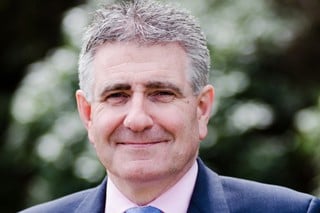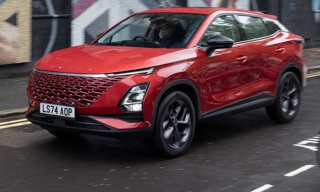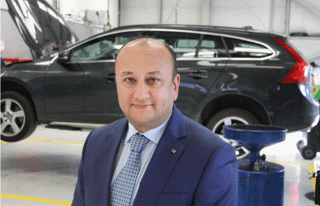Since 2008, Marshall Motor Group has changed beyond recognition – in size, brand representation and financial performance.
Since 2008, Marshall Motor Group has changed beyond recognition – in size, brand representation and financial performance.
Since 2008, Marshall Motor Group has changed beyond recognition – in size, brand representation and financial performance.
Since 2008, Marshall Motor Group has changed beyond recognition – in size, brand representation and financial performance.
From being an East Anglia-centred business, with a volume brand focus at 40 centres and £250 million turnover, it is now one of only 10 UK dealer groups with turnover in excess of £1 billion; staff numbers have increased 275% and it has 70 dealerships in 17 counties [see panel, right], with a brand portfolio dominated by prestige or premium brands and biased towards Volkswagen Group. Over the same time period, Marshall exited 22 of its original 42 businesses.
 |
|||
FOCUSING ON PEOPLEMarshall’s CEO Daksh Gupta is one of the speakers at the AM/IMI People Conference on June 12. He will highlight the correlation between Marshall’s people-focused strategy and strong financial performance, focussing on the group’s induction programme, recruitment and appraisal processes, its leadership development and the Marshall Academy. He will detail the importance he places on his staff in maximising the opportunities provided by the past five years of change, while ensuring Marshall improves its standing as ‘a great place to work.’ For more information on the conference, visit our conference homepage. |
|||
 |
|||
Driving this expansion was a policy of acquiring underperforming businesses, made possible in part by a recession that left many owners and managers looking for the exit signs.
While opportunities to acquire will be considered, the ‘land grab’ of the past five years is now effectively over. New challenges have to be tackled, growing pains addressed.
Through acquisitions, brand portfolio upheaval and an expansion into new parts of the country, the focus at Marshall is to build on the culture, address the negative impact underperforming businesses have had on the bottom line and then exploit their potential.
Simultaneously, the group is facing the same challenges as its peers: a buoyant market following a long-term slump and the shift online in how consumers search and shop for cars.
Phase one was 2008-2013 – tackling those challenges listed above. From 2014 onwards is phase two, says Marshall’s chief executive, Daksh Gupta.
“We are still in a growth mode. But are we going to grow as fast, another 400%, in five years? No,” he said. “But we are going to continue to grow. It will be with only existing partners or additional premium or specialist brands.
Phase two is making sure we maximise the profit opportunity from the business.
“2014 will be my first year with no disposals. It will also be the first year where we haven’t got a huge amount of churn in the brand portfolio and we’re concentrating on driving the business, which is the core of phase two.”
To put it into a market context, Gupta believes that, despite a more confident European market, “phenomenally cheap” low-rate PCP deals in the UK are leading consumers to understand the value of car ‘rental’ as opposed to ownership.
He believes the Society of Motor Manufacturer and Traders’ (SMMT) forecast of a 1.2% increase in new car registrations in 2014 is conservative and that manufacturers will be pushing for more. Last year brought 2.3m registrations. Gupta believes 2014 could end with a 2.4m market.
“A stronger Europe may mean OEMs reduce the pressure on the UK, but the availability of cheap finance here will continue to power the market.”
He is ready for the expanded market to mitigate the fall in vehicle parc in the past four or five years and its negative impact on aftersales absorption. The all-dealer average is at about 53% – Marshall was at 63% at the end of December.
“If a manufacturer wants to set us a target of 1,000 cars, I want to sell 10,000 cars. Every time I sell a car, I get the PDI (pre-delivery inspection) revenue for my service department, I get the opportunity to sell F&I and the downstream aftersales profit, too, if I sell them a service plan and I look after them properly,” Gupta said.
“When I hear people say a 2.4m-2.6m market isn’t sustainable, I disagree – as long as our behaviour towards the customer is right.”
Marshall’s order take in January was up nearly 20% on a record performance for the same month in 2013.
[page-break]Customers are more confident of their economic situation, of the economy and crucially what they need and expect from their target car and a dealer. They understand depreciation, the painful loss of value of an expensive cash purchase, the impact of servicing costs and importance of fuel economy – how the road tax on a Range Rover can be £1,000 for an old model and £400 for a new one thanks to its aluminium body and efficient engine – and the benefits of finance packages and service plans.
The impact of the internet
Gupta is all too aware that consumers are not learning these lessons in dealerships, but on the internet. He states that 97% of his customers have spent an average of 11 hours on the internet before they visit a showroom.
Showroom enquiry levels are down. But Gupta rejects any suggestion that sales staff have, or will become, order-takers for consumers looking to ‘buy and go’.
“The customer still has a choice of which dealer they want to buy from. They might have made their car choice and they might have spent 11 hours on research, but we still need to be able to educate them in terms of what the right model is, what availability is: wait four, five, six months or be sold one that we have in stock.
“Likewise, we as a retailer have to make the decision to sell to our customer. What’s stopping a customer buying from one of my competitors? If we don’t sell the Marshall benefits, my competitors win. The experience has got to be right, not just the transaction.”
One of the factors he is battling is overcomplicated customer satisfaction measures imposed by manufacturers.
“One links a bonus to whether a customer was introduced to the service department. If I can’t tick this box, it doesn’t mean the customer had a bad experience. It may have been an irrelevance compared to the car being delivered on time and in the expected condition,” Gupta said. Manufacturers can focus too much on adherence to process rather than genuine customer experience.
[page-break]Mercedes-Benz, he said, has it right with a Net Promoter score. This is based on one question: ‘How likely are you to recommend our company/product/service to your friends and colleagues?’ “All the rest of a CSI questionnaire is noise,” Gupta said. “We might not have followed you up within 36 minutes of leaving the showroom or we might not have introduced you to the service department, but overall were you really pleased with the experience?”
To this end, all Marshall staff have been educated on the value of experience and its part in customer retention. Every business has service plan targets; staff pay, including business managers’ from this year, is linked to service plan sales.
Marshall has changed showroom staff’s sale process, taking the traditional 10-step process and changing it in recognition of the internet’s influence.
Gupta says customers are given the opportunity to explain the outcome of their 11 hours of internet research, their car choice, the specification, the colour. Then it is the salesperson’s job to find out what funding options are available based around the traditional elements of their budget, the selling price of the new car and a part-exchange valuation.
“Part of our value is in educating the customer into making sure they can afford a particular vehicle. Equally, we can guide them away from what an internet search led them to, to a vehicle with better spec, but on a low rate-finance deal. Or, a specific example, a base model Mercedes C-Class can have a significantly worse residual value than if you added features such as leather and satellite navigation. With a PCP, a customer can be in a car they didn’t think at the outset they could afford and be in a strong situation financially overall.
“Dealers add the value here.”
Three dealer functions the internet can never replace
It is around this point that Gupta believes the franchised dealer model becomes secure, because of what it brings to the deal that the internet will not be able to.
He believes the internet will never be able to give a true value of the part-exchange, will never be able to prompt the emotional response required for a consumer to make a buying decision and cannot provide the process and mechanism to ensure the car is serviced.
[page-break]“As long as you fundamentally believe the internet cannot deliver those three things, we have a franchised retail business,” Gupta said.
But what of Marshall’s staff? Numerous dealers cite John Lewis as the epitome of a customer-focused, rather than sales-focused business.
Gupta is among them. And he knows the challenge is considerable and that it affects the way staff are treated, recruited, trained, rewarded and paid.
It is a cornerstone of the next five years or ‘phase two’ of the business plan.
Newly appointed sales managers, service managers and business manager are assessed on their people management skills, their working values – and if they can read a set of accounts – before they start working for Marshall.
“I’m looking for positive attitude. Do they display integrity, do they have a focus on customer value, do they really recognise that people are at the heart of the success of the organisation? Are they innovative, are they creative?”
Gupta said he was satisfied with his “top 100” senior managers, but there are 375 other managers who “manage the troops” – the remainder of those in the total 2,100 headcount.
And the troops are the most important since they are customer facing.
“If a salesperson looks like an unmade bed, we rely on our sales managers to take them to task. If a service adviser is talking to a customer rudely and not building a relationship, we expect our service managers to coach them.
“The most important level in our business is our line managers.”
Marshall has invested in its own training academy, it has two full-time trainers and line management assessments are now mandatory to address what Gupta calls the “rubbish” record of training in the sector. All new starters, wherever they are based in the business, have a one-day induction at Cambridge headquarters, they meet one of the directors, they are shown around the business and they are told what their “emotional contract” is with our business.
Training, training and more training
Service advisers and salespeople are put on a mandatory one-week residential course, no matter how long they have worked in the sector, and are trained on customer handling skills, relationship building, the benefits of service plans and other products of benefit to customers.
But is Marshall generating leaders or regiments of foot soldiers?
[page-break]“We want people with a personality. The change to our sales process – called internally ‘selling by objectives’ – says you need to be intelligent enough to complete at transaction, but it’s the people skills aspect of it is that’s going to make you successful.
“Customers are much better educated on their choices, so what’s fundamentally different at Marshall is we are asking the customer far more open questions, getting them to tell us what they want, less selling to them.
“For example, a customer might only want a value on their part-exchange. Previously, a salesperson would’ve been shot if you went straight to this step, because you should have found out what they were looking to buy.
“Now, we treat the customer with a bit of respect and let them take a bit more of the control, recognising that they are far more educated than they used to be.”
Alongside the showroom experience, emphasis is being put on email handling, with 20% of management bonus for sales managers linked to speed of response, monitored through nine mystery shops every quarter in each Marshall business.
To ensure a quality response, a template is used, which emphasises reasons to buy from Marshall and the long-standing heritage of the family business.
Online communication is a unique skill, Gupta acknowledges, so he is considering courses for sales people on how it’s done correctly. The typical email staff are fielding is “I have a budget of £X. What can I buy?”
Marshall expects emails to be responded to in an hour or, if received overnight, by 10am the next day.
Gupta wouldn’t give details on the impact on conversion levels based on the new sales approach and the quality of email response, other than conversion levels are improving.
However, he said: “We do not need to spend any more on marketing – it’s money wasted. Quite frankly, we should easing back. I don’t need any more leads. What we should be doing is converting more of what we’ve got.”
Joining the £1 billion club
Marshall Motor Group chief executive Daksh Gupta tweeted on February 26 that the motor retailer’s turnover had put it in ‘the billion pound club’.
In November’s AM100 update, Marshall – at number 10 – had a turnover in its 2012 statutory accounts of £794 million. The remainder of the top 10 all had £1bn-plus turnover.
The achievement is a milestone in what Gupta has called phase one of the group’s business plan: the first five years of his tenure, during which he led the reshaping of the group.
[page-break]“We’ve built it nationally, we’ve balanced our brand portfolio so we stopped competing with ourselves in East Anglia and increased our depth of representation with our core partners, and increased it into scalable markets.”
The five years saw Marshall exit 22 businesses from an original 42. But while it was represented in six counties in 2008, it is now in 17, including Devon, Cumbria, Yorkshire and Essex. Staff numbers have grown from 800 to 2,100.
In 2008, turnover per site was £9.7m. Today, with 70 sites, it’s £15.6m.
“It’s quite well known that we were a bit sleepy pre-2008, and while the figures today are impressive, we were starting from a low base,” Gupta said.
He said the motor group expects an operating profit of about £12m for the year.
Its underlying EBITDA is about £15.1m and return on capital employed (ROCE) is 17%. Gupta says 20% is within the group’s grasp.
“There is massive latent potential, particularly the acquired businesses.”
Robert Marshall, chief executive of parent Marshall Group, said: “The progress of the motor group has been fantastic over the last five years. We’ve gone from being largely local to being substantially national and with a better portfolio, better risk profile, better management, better people engagement and better customer satisfaction. It’s excellent all round.”
Login to continue reading
Or register with AM-online to keep up to date with the latest UK automotive retail industry news and insight.





















Name Witheld - 14/04/2014 09:00
Interesting, Daksh Gupta makes no mention of staff retention and satisfaction, having worked for this group I can honestly say that I have never worked in an organisation that has so little regard for employee wellbeing, retention and job satisfaction. Many of the employees I worked with were overworked, underpaid and felt undervalued.